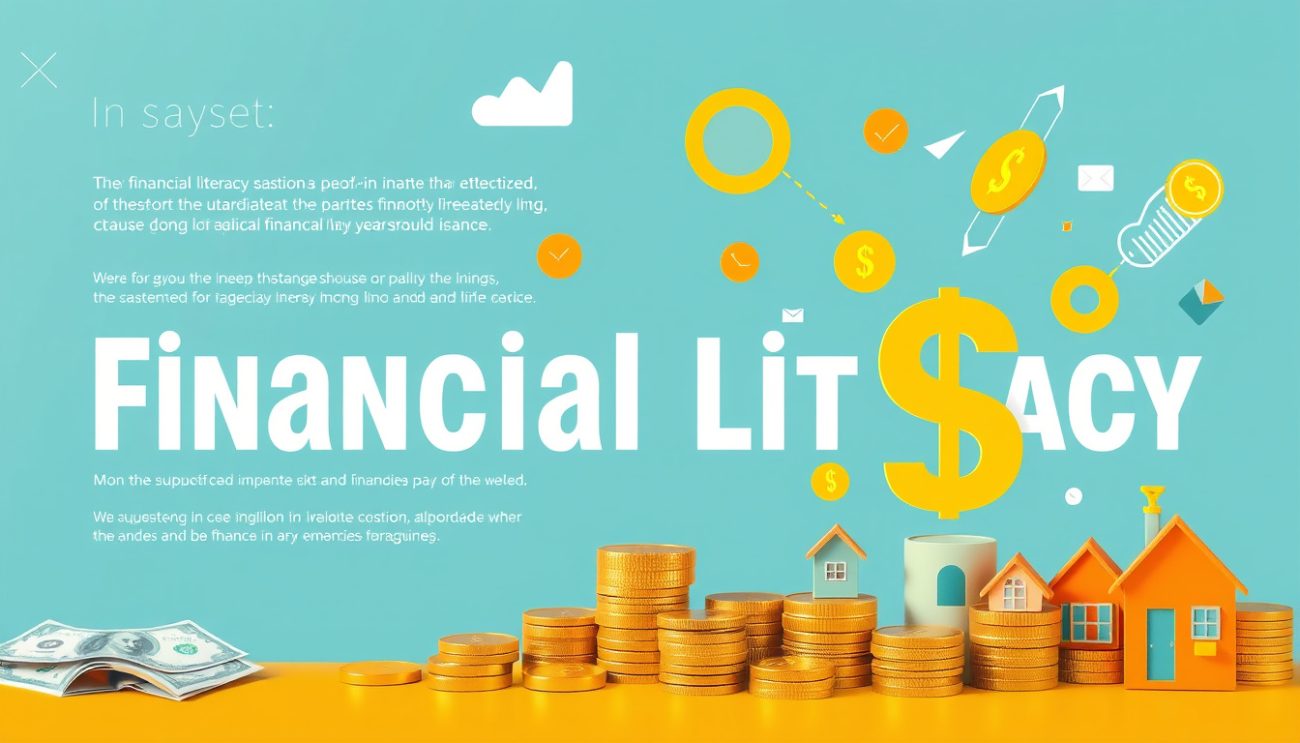Mastering Financial Literacy: Your Ultimate Guide to Managing Money and Building Wealth
Financial literacy stands at the core of sound money management and wealth accumulation. It is the essential skill set empowering individuals to make informed financial decisions, establish a secure future, and navigate the complexities of

Financial literacy stands at the core of sound money management and wealth accumulation. It is the essential skill set empowering individuals to make informed financial decisions, establish a secure future, and navigate the complexities of the modern economy. Whether you’re a student just stepping into adult responsibilities, a young professional, or planning for retirement, mastering financial literacy can transform your financial life.

What Is Financial Literacy?
Financial literacy is the ability to understand and effectively use various financial skills, including personal financial management, budgeting, saving, investing, and debt management. It encompasses the knowledge and confidence necessary to make informed and responsible decisions about finances.
According to the National Financial Educators Council, financial literacy enables you to manage money wisely and plan for future financial well-being. This broad skill set promotes financial self-sufficiency, stability, and long-term wealth building.
Why Is Financial Literacy Important?
The importance of financial literacy can hardly be overstated:
- Empowers Informed Decisions: Understanding fundamental financial concepts helps avoid common pitfalls such as excessive debt or poor investment choices.
- Promotes Financial Stability: By managing income, expenses, assets, and liabilities, financially literate individuals enjoy greater control over their money and less stress.
- Protects Against Fraud: Knowledgeable individuals are better equipped to avoid scams and identity theft.
- Supports Goal Achievement: From buying a home to saving for retirement, sound financial management aids in reaching personal milestones.
- Prepares for Emergencies: Financially literate people tend to build emergency funds to cushion unexpected expenses like job loss or medical bills.
Core Principles of Financial Literacy
Mastering financial literacy often involves understanding and applying five core principles:
1. Earning: Managing Income Wisely
Your income forms the foundation of your financial life. Effective money management starts with living within your means, understanding your pay and benefits, and maximizing earning opportunities.
- Live Within Your Means: Avoid lifestyle inflation and unnecessary debt.
- Optimize Benefits: Take full advantage of employer matches in retirement plans like 401(k)s.
- Automate Savings: Set up automatic contributions to savings and retirement accounts.
2. Budgeting: Planning and Controlling Your Spending
A budget is essentially a roadmap for your money. It tracks income and expenses, helping you control spending and prioritize savings.
- Start Simple: Estimate monthly income and categorize expenses (rent, food, entertainment, books, etc.).
- Track and Adjust: Keep regular tabs on your spending to identify overruns or savings potential.
- Distinguish Needs vs. Wants: For instance, cutting back on daily luxuries like coffee can save hundreds annually.
- Use Tools: Budgeting apps can simplify tracking by linking to bank and credit accounts.
3. Saving and Investing: Growing Your Wealth
Saving involves setting money aside for short and long-term goals, while investing uses money to generate returns over time.
- Set Clear Goals: Whether it’s an emergency fund, a down payment, or retirement, define targets.
- Start Early: Compound interest can dramatically increase wealth over time.
- Diversify Investments: Understand different vehicles like stocks, bonds, mutual funds, and retirement accounts.
- Protect Savings: Ensure some funds are liquid for emergencies and others work harder through investments.
4. Borrowing and Managing Debt Responsibly
Credit can be a useful financial tool, but mismanagement leads to costly consequences.
- Understand Credit Reports and Scores: These reflect your borrowing reputation and affect loan terms.
- Monitor Credit Annually: Check reports for accuracy to prevent fraud.
- Borrow Within Means: Avoid excessive or high-interest debt that strains your budget.
- Prioritize Debt Repayment: Especially on high-interest debts like credit cards.
5. Protecting Assets: Safeguarding Your Financial Future
Protection covers insurance (health, auto, home), estate planning, and risk management strategies.
- Get Adequate Insurance: Protect against large, unexpected expenses.
- Plan for Retirement: Use tools like IRAs or 401(k)s to ensure income in later years.
- Be Prepared: Have plans in place to handle emergencies and unforeseen financial shocks.
Financial Literacy and Millennials: Challenges and Opportunities
Studies show that many millennials struggle with financial literacy, resulting in high debt levels, inconsistent savings habits, and vulnerability to predatory lending.
Challenges include:
- High Student Loans and Mortgage Debt
- Lack of Emergency Funds
- Limited Knowledge of Investing and Retirement Planning
Addressing these gaps by learning and applying financial literacy principles early can turn these obstacles into stepping stones for lasting financial security.
Teaching Financial Literacy: Why Start Early?
Financial literacy is most effective when instilled early. Educating teens and young adults about budgeting, credit, saving, and investing equips them for financial independence. Early comprehension fosters better habits, reduces vulnerability to financial fraud, and empowers youth to make smarter lifetime money decisions.
Resources like government-sponsored programs (e.g., MyMoney.gov) and free online courses provide accessible starting points for learners at all stages.
Tips for Building Your Financial Literacy Today
- Set Financial Goals: Define what you want to achieve financially in the short and long term.
- Create and Maintain a Budget: Regularly review and adjust to stay aligned with your goals.
- Build an Emergency Fund: Aim to save 3–6 months of living expenses.
- Monitor and Improve Your Credit: Use free resources to understand and boost your credit score.
- Educate Yourself: Read trusted financial publications, attend workshops, and consult advisors when needed.
Conclusion
Mastering financial literacy is not about having a degree in finance; it is about developing skills that help you live within your means, save wisely, manage credit prudently, and protect what you have. By embracing the five key principles of financial literacy—earning, budgeting, saving and investing, borrowing responsibly, and protecting assets—you lay the groundwork for financial stability and wealth accumulation.
Start your financial literacy journey today, and build a future where financial worries take a back seat to opportunity and confidence.
Sources:
- Harvard College Financial Literacy Resources
- Annuity.org: The 5 Principles of Financial Literacy
- Investopedia: Financial Literacy Importance and Education



